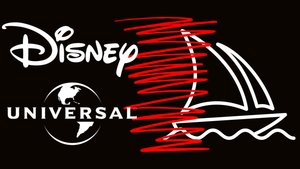Hollywood has joined the AI litigation party with the Disney and Universal film studios suing Midjourney, an image-generating AI platform which - they say - is “the quintessential copyright free-rider” and “a bottomless pit of plagiarism”. Midjourney’s AI image-generating service, they add, “functions as a virtual vending machine, generating endless unauthorised copies of Disney and Universal’s copyrighted works”.
Although it’s entirely a movie industry led lawsuit - the Universal film studio being separate to the Universal music company - each legal battle relating to copyright and AI has the potential to impact on the all different strands of the media and entertainment business, given they often test legal principles that apply to all copyright owners.
Which is why the Recording Industry Association Of America was among those to welcome the first major AI lawsuit instigated by Hollywood, with the trade body’s CEO Mitch Glazier declaring that “this action by Disney and Universal represents a critical stand for human creativity and responsible innovation”.
Glazier stressed that music and movie companies are keen to work with AI platforms, but not those that exploit copyright-protected works without getting permission from the copyright owners.
“There is a clear path forward through partnerships that both further AI innovation and foster human artistry”, he said, adding, “unfortunately, some bad actors - like Midjourney - see only a zero-sum, winner-take-all game. These short-sighted AI companies are stealing human-created works to generate machine-created, virtually identical products for their own commercial gain”.
This, he says, is “not only a violation of black letter copyright law but also manifestly unfair”. That’s a sentiment unsurprisingly echoed by the film studios in their lawsuit, where they stress the importance of upholding US copyright law and the “crucial incentives” it provides to “reward those who create, not those who take”.
Many of the lawsuits filed by copyright owners against AI companies make allegations in relation to both the input and the output of the targeted AI models.
First, the AI company infringes copyright by making copies of existing works in order to train its model, so on the input. Then it infringes copyright when the model generates content that is almost identical to existing works, so on the output.
In some cases the allegations relating to the output have been dismissed by the courts. AI companies often argue that models outputting existing works is the exception rather than the norm, that it often requires the user of the AI to enter very specific prompts, and that ‘guardrails’ can be put in place to stop that from happening.
These were the arguments put forward by Anthropic in its legal battle with a group of music publishers in relation to its Claude AI outputting lyrics to existing songs.
However, in the Hollywood case against Midjourney, the claims relating to the output are arguably stronger, because the AI is generating images that clearly contain characters owned by the studios.
The lawsuit deals with this at length, showing Midjourney-generated images that feature characters from Star Wars and The Simpsons, as well as Marvel and Pixar movies, and other franchises owned by the film companies.
The studios also note that some other AI models have ‘technological measures’ to stop blatant copyright infringement on the output. Midjourney has technological measures to stop the AI from generating images of violence or nudity, but not to stop copyright infringement.
Before filing its lawsuit, the studios say they “asked Midjourney to stop its theft of their intellectual property” by implementing some technological measures similar to those employed by their competitors. But, “instead of stopping its infringement, Midjourney has continued to release new versions of its image service, which, according to Midjourney’s founder and CEO, have even higher quality infringing images”.
As this particular lawsuit progresses, there could be some interesting debates about how copyright law protects characters. Plus Midjourney will almost certainly respond with a ‘fair use’ defence, arguing that their use of existing works - on both the input and output - constitutes fair use under US copyright law. Which means copyright owner permission is not required.
Some of these issues will be mainly relevant to those working in the audio-visual domain, though plenty of the debates will also be relevant to copyright owners more generally, including those in music.

